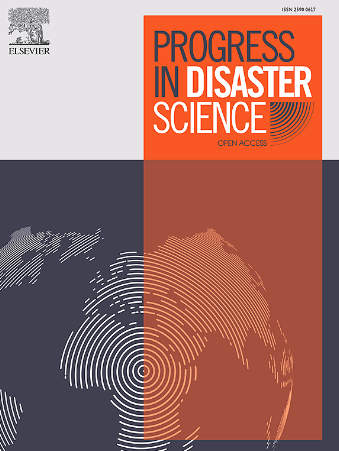Reimagining urban resilience and education hubs using a community-engaged, equity-centered approach
IF 3.8
Q3 ENVIRONMENTAL SCIENCES
引用次数: 0
Abstract
Resilience hubs provide temporary electricity-related services, connectivity, and essential resources in response to climate-related disasters, offering a critical solution for enhancing community resilience. Historically marginalized and lower-income populations face heightened vulnerability to external shocks that threaten their ability to recover from disasters. This article presents a case study of a co-designed resilience and education hub in the City of Orlando, developed through a community-engaged and equity-centered approach. Over six months, a team of interdisciplinary researchers collaborated with 20 community members, and surveyed over 300 local residents, and workshopped ideas with Orlando youth to identify values critical to the hub's design. These values encompassed physical infrastructure, social connectivity, and educational resources tailored to the community's unique needs. Key outcomes include the design of a portable Resilience, Education, and Advocacy Center for Hazard preparedness (REACH hub) featuring modular technology and interactive educational tools. This article proposes a replicable framework for other communities to co-develop equity-focused resilience hubs through academic, civic, and community partnerships.
采用社区参与、以公平为中心的方法重塑城市韧性和教育中心
恢复力中心为应对气候相关灾害提供临时电力相关服务、连通性和必要资源,为增强社区恢复力提供了关键解决方案。历史上处于边缘地位的低收入人口更容易受到威胁其灾后恢复能力的外部冲击的影响。本文介绍了奥兰多市通过社区参与和以公平为中心的方法共同设计的弹性和教育中心的案例研究。在六个多月的时间里,一个跨学科的研究团队与20个社区成员合作,调查了300多名当地居民,并与奥兰多青年一起讨论了想法,以确定对中心设计至关重要的价值观。这些价值包括物理基础设施、社会连接和针对社区独特需求的教育资源。主要成果包括设计了一个具有模块化技术和交互式教育工具的便携式灾害准备韧性、教育和宣传中心(REACH中心)。本文提出了一个可复制的框架,供其他社区通过学术、公民和社区伙伴关系共同发展以公平为重点的弹性中心。
本文章由计算机程序翻译,如有差异,请以英文原文为准。
求助全文
约1分钟内获得全文
求助全文
来源期刊

Progress in Disaster Science
Social Sciences-Safety Research
CiteScore
14.60
自引率
3.20%
发文量
51
审稿时长
12 weeks
期刊介绍:
Progress in Disaster Science is a Gold Open Access journal focusing on integrating research and policy in disaster research, and publishes original research papers and invited viewpoint articles on disaster risk reduction; response; emergency management and recovery.
A key part of the Journal's Publication output will see key experts invited to assess and comment on the current trends in disaster research, as well as highlight key papers.
 求助内容:
求助内容: 应助结果提醒方式:
应助结果提醒方式:


